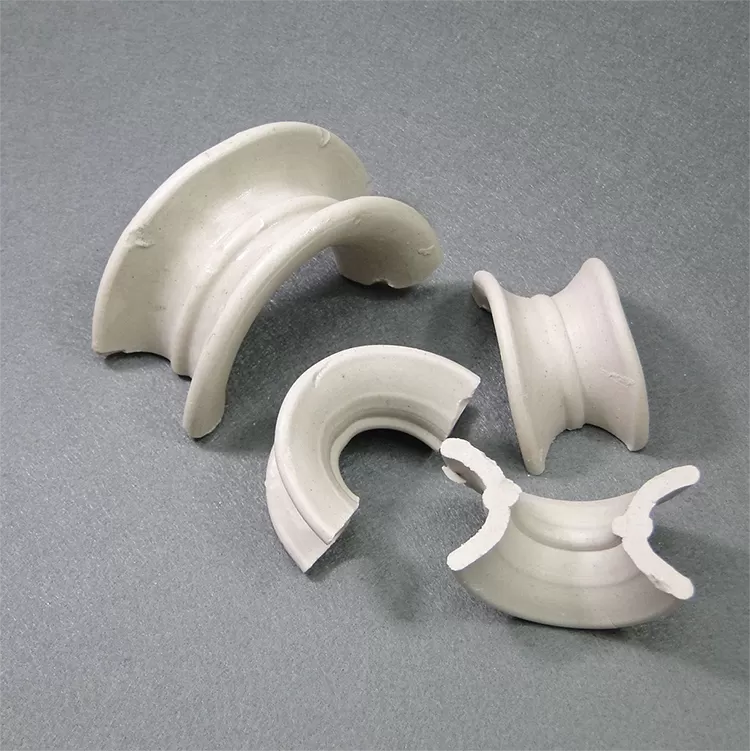Ceramic Intalox Saddle Service Life
Ceramic Intalox saddle packing, a key component in industrial separation equipment, has a service life directly linked to operational efficiency and cost control. Its lifespan is influenced by multiple factors, including material quality, operating conditions, maintenance practices, and application environments, with typical service cycles ranging from 3 to 10 years under normal circumstances.

Impact of Material Grade on Lifespan
The alumina content in ceramic saddles is a core factor affecting durability. General-purpose ceramic saddles with 75% alumina content, due to relatively lower density and mechanical strength, are prone to wear and corrosion in long-term operation, especially in high-velocity fluid or moderate corrosive environments, with an average service life of 3–5 years. High-performance ceramic saddles with ≥90% alumina content, featuring higher hardness (Mohs hardness ≥8) and better chemical stability, can resist erosion from acidic/alkaline media and particle impact, extending their service life to 7–10 years in harsh conditions such as high-temperature distillation or strong acid absorption columns.
Influence of Operating Conditions
Operating parameters significantly impact lifespan. In low-load, mild-condition applications (e.g., normal-temperature water treatment or weak solvent absorption), where fluid velocity is low (≤1 m/s) and media are non-corrosive, ceramic saddles experience minimal wear and chemical attack, often exceeding the average service life. Conversely, in high-load scenarios—such as high-temperature (>600°C) flue gas treatment, high-velocity gas-liquid flow (>3 m/s), or contact with strong corrosive media (e.g., concentrated sulfuric acid, sodium hydroxide solutions)—the packing undergoes accelerated erosion, thermal stress, and chemical reactions, potentially reducing lifespan by 30–50%. Frequent temperature fluctuations (>100°C/hour) can also cause thermal fatigue, leading to cracks and premature failure.
Role of Maintenance and Installation
Proper installation and regular maintenance can effectively extend service life. During installation, uneven packing (resulting in bridging or voids) causes localized high-velocity fluid scouring, leading to uneven wear; thus, standards require layer-by-layer vibration compaction to ensure uniform density. Regular maintenance, such as periodic cleaning to remove scaling or sediment (especially in wastewater treatment applications), prevents blockages and localized corrosion. Post-maintenance inspections—including checking for cracks, measuring wear depth, and testing compressive strength—allow early detection of performance degradation, enabling timely replacement of severely damaged packing to avoid affecting overall column efficiency.
Lifespan Differences in Typical Applications
Service life varies across industries. In general chemical processing (e.g., solvent distillation with moderate temperatures and pressures), ceramic saddles typically last 5–7 years. In environmental protection fields (e.g., flue gas desulfurization columns with acidic spray), due to continuous contact with sulfite solutions, even high-alumina saddles have a shorter lifespan of 4–6 years. In high-purity pharmaceutical or food processing, where operating conditions are strictly controlled and media are clean, the service life often reaches 8–10 years. For extreme applications like high-temperature incineration gas treatment, the lifespan may be shortened to 2–3 years due to severe thermal shock and ash particle erosion.
Signs of End-of-Life and Replacement Indicators
Key indicators for replacement include: significant increases in column pressure drop (>30% compared to initial operation), indicating packing blockage or deformation; decreased separation efficiency (e.g., product purity dropping below standard), caused by excessive wear reducing specific surface area; visible cracks, fragmentation, or surface peeling in more than 10% of sampled packing; and inability to restore performance through cleaning or maintenance. Timely replacement ensures stable operation of separation processes and avoids secondary damage to equipment due to packing failure.

